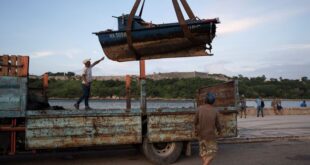GENEVA (Reuters) – The United Nations High Commissioner for Human Rights (OHCHR) deployed a field team on Friday to investigate an air strike on the Ukrainian village of Hroza that left at least 52 people dead.
A missile slammed into a cafe and grocery store in the village on Thursday as people gathered to mourn a fallen Ukrainian soldier. OCHR said it had likely been fired by Russia but that it was too early to say for certain.
“The UN High Commissioner for Human Rights, Volker Turk, who saw for himself the horrific impact of such strikes, is profoundly shocked and condemns these killings,” OHCHR spokesperson Elizabeth Throssell told reporters in Geneva.
“He has deployed a field team to the site to speak to survivors and gather more information.”
Three days of mourning was announced in the Kharkiv region after the attack, the deadliest in the region since Russia’s invasion more than 19 months ago. It was also one of the biggest civilian death tolls in any single Russian strike.
Moscow denies deliberately targeting civilians, but many have been killed in attacks that have hit residential areas as well as energy, defence, port, grain and other facilities.
“At this stage, it’s obviously very difficult to establish with absolute certainty what happened,” Throssell said.
“But given the location, given the fact that the cafe was struck, and the indications are that it was a Russian missile.”
She added, however, that the attack needed to be looked at further.
“The absolutely clear thing is that there was horrible loss of life and of course, that is to be deplored in all circumstances.”
Throssell said OHCHR’s human rights monitoring mission in Ukraine have established the names of 35 people who were killed in the strike, including 19 women, 15 men and an eight-year-old boy.
“Before the Russian invasion, the village’s population was about 300,” Throssell said. “It’s not clear how many residents were still living there, but it’s clear that with the high number of people killed, everybody in this small community has been affected.”
(Reporting by Gabrielle Tétrault-Farber; Editing by Alison Williams and Philippa Fletcher)
 BeritaKini.biz Berita Viral Terkini di Malaysia
BeritaKini.biz Berita Viral Terkini di Malaysia





